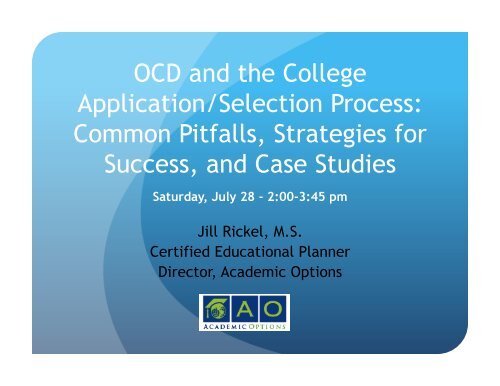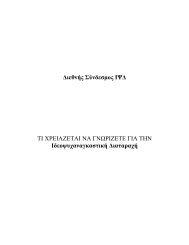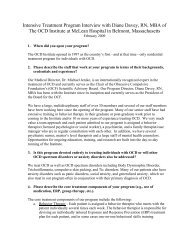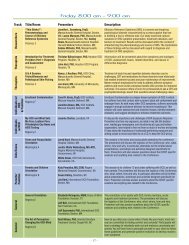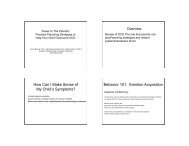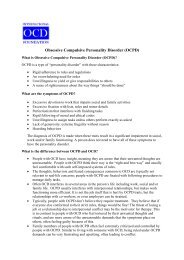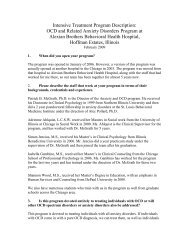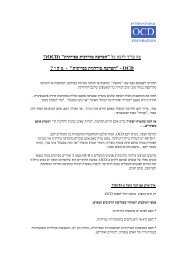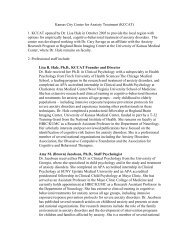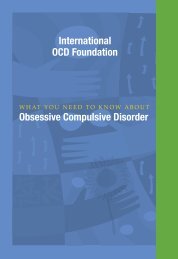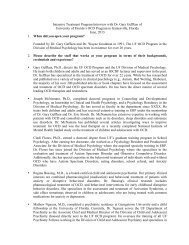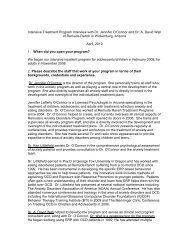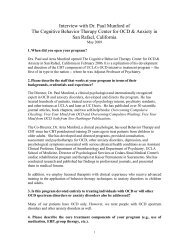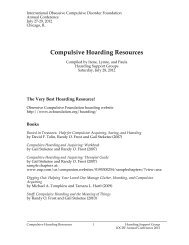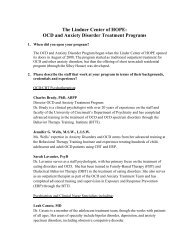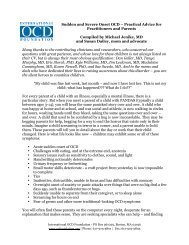OCD and the College Application Process - Obsessive-Compulsive ...
OCD and the College Application Process - Obsessive-Compulsive ...
OCD and the College Application Process - Obsessive-Compulsive ...
Create successful ePaper yourself
Turn your PDF publications into a flip-book with our unique Google optimized e-Paper software.
<strong>OCD</strong> <strong>and</strong> <strong>the</strong> <strong>College</strong><br />
<strong>Application</strong>/Selection <strong>Process</strong>:<br />
Common Pitfalls, Strategies for<br />
Success, <strong>and</strong> Case Studies<br />
Saturday, July 28 - 2:00-3:45 pm<br />
Jill Rickel, M.S.<br />
Certified Educational Planner<br />
Director, Academic Options
Deciding whe<strong>the</strong>r or not to go away: Pitfalls<br />
Hoping that <strong>OCD</strong> does not follow you<br />
Not recognizing <strong>the</strong> stresses of colleges<br />
Believing that waiting a little longer will help you be<br />
ready
Getting Help in Choosing <strong>the</strong> Right <strong>College</strong><br />
Recognize <strong>the</strong> limitations of high schools<br />
New York, NY (PRWEB) March 16, 2011- According to<br />
a US. Department of Education Guidance School<br />
survey, over-stretched school guidance counselors<br />
are only providing an average of 38 minutes of<br />
college admissions advice per US high school<br />
student.<br />
Be armed to do your own research
Being aware of <strong>the</strong> most common difficulties<br />
for college students with <strong>OCD</strong><br />
Sleep<br />
Meals<br />
Schoolwork<br />
Class<br />
Tests
Sleep: worries or ritual delaying bedtime or preventing falling asleep;<br />
making lists, reviewing conversations to detect mistakes, checking <strong>and</strong><br />
placing items before allowing self to rest<br />
Meals: missing meals, idiosyncratic or non-nutritious eating, eating in<br />
isolation, not being able to make decisions when shopping for food<br />
Schoolwork: obsessing over whe<strong>the</strong>r fully underst<strong>and</strong> assignments, asking<br />
long, odd, or overly detailed questions, annoying professors, obsessing<br />
over "right" way to express thoughts in writing<br />
In class: fear of stating something immoral or mistaken so say nothing,<br />
worried o<strong>the</strong>rs notice <strong>the</strong>y are having problems<br />
Tests: working too slowly, re-checking answers, being indecisive, intrusive<br />
thoughts distracting self, overly sensitive to where o<strong>the</strong>rs are sitting or<br />
how <strong>the</strong>y are moving, fear of germs<br />
Social: hyper-morality, being too blunt or opinionated or no gray areasnot<br />
being able to compromise, fear of magically ingesting drugs or<br />
alcohol, fear of STD or o<strong>the</strong>r illnesses
Balancing on a Three-Legged Stool
Preparing for Support on Campus<br />
Make support a part of <strong>the</strong> process
Competitiveness of <strong>College</strong><br />
• Where do I Fit in<br />
• Competitive vs. Cooperative Campus<br />
Academic Focus of <strong>College</strong><br />
• Group projects<br />
• Class presentations/Discussions<br />
• Writing or reading
Quality of Support Services on Campus<br />
• Disability Support<br />
• Counseling Center<br />
• Support Groups<br />
• Academic Support<br />
Tutoring<br />
Time Management<br />
Study Skills<br />
Writing Center
Campus Visits<br />
• Make appointments with all departments<br />
Locate Professionals off Campus<br />
• Cognitive Behavioral Therapists<br />
• Support Groups
When Should I Disclose<br />
• In <strong>the</strong> <strong>Application</strong><br />
• Special Consideration<br />
• The <strong>College</strong> Essay<br />
• Explanation not Excuse<br />
• Upon Admission
To Whom Should I Disclose<br />
• Counseling Center<br />
• Disability Support
How Do I Disclose<br />
• Registration<br />
Documentation<br />
• Testing/Letter<br />
• IEP’s <strong>and</strong> 504 Plans<br />
• History<br />
• DSM Diagnosis<br />
• Impact on Functioning<br />
• Recommendations for<br />
Accommodations<br />
• DSS Appointment
Why Should I Disclose<br />
• Contact Person
Why Should I Disclose (Cont.)<br />
• Academic Accommodations<br />
• Extended Time, Note-Takers, Distraction Free<br />
Testing, Priority Registration<br />
• Housing Accommodations<br />
• Explanation in Retrospect<br />
Common Concerns<br />
• Discrimination<br />
• Privacy
Campus Visits<br />
• Second Visit upon Admission<br />
• Overnights<br />
• Shadowing<br />
• Visit DSS with Documentation<br />
• May 1 st Deadline<br />
• Is <strong>OCD</strong> Getting in <strong>the</strong> Way of <strong>the</strong> Decision
Comprehensive Academic Support Programs<br />
Campus Based<br />
Young Adult Post-Secondary Programs<br />
Private Support Programs
Levels of Academic Support on Campus<br />
©2007 Jill Rickel <strong>and</strong> Academic Options Weston, Florida
Therapeutic Support Programs<br />
Young Adult Post Secondary Programs<br />
Who <strong>the</strong>y serve:<br />
18-26 year olds<br />
<strong>OCD</strong> <strong>and</strong>/or LD, ADHD, Asperger's, High Functioning<br />
Autism, NVLD,<br />
Self Esteem Issues, PTSD, Depression, Bi-Polar Disorder,<br />
Failure to Launch<br />
Substance abuse <strong>and</strong> more complicated psychiatric<br />
disorders
Therapeutic Support Programs<br />
Young Adult Post Secondary Programs (Cont.)<br />
Length of Stay:<br />
6-24 months typical – Most require a minimum stay<br />
Students typically transfer to college of choice<br />
following program<br />
2 Therapeutic Models:<br />
Coaching – experienced life coaches with outside<br />
<strong>the</strong>rapy available<br />
Clinical – staff <strong>the</strong>rapists; individual <strong>and</strong> group <strong>the</strong>rapy<br />
several times a week. Appropriate for students in need<br />
of fur<strong>the</strong>r treatment for <strong>OCD</strong> <strong>and</strong> related disorders.
Young Adult Post Secondary Programs (Cont.)<br />
Program Highlights (programs vary <strong>and</strong> may not include all of<br />
<strong>the</strong> following):<br />
24/7 to complete independence at onset<br />
Dorm, small house, or apartment living<br />
Several college options, vocational, <strong>and</strong> high school completion<br />
Academic tutoring <strong>and</strong> support<br />
Educational/Career planning<br />
Clean <strong>and</strong> sober environment - 12 Step, AA, NA<br />
Work, Internships – coaching <strong>and</strong> placement<br />
Social Skills <strong>and</strong> Social opportunities, Social Mentoring<br />
Counseling – Individual <strong>and</strong>/or group<br />
Independent Living Skills – household maintenance, budgeting,<br />
cooking, shopping, mobility training, personal hygiene, sexuality…<br />
Outreach – continued <strong>the</strong>rapeutic support while student<br />
transitions to independent, community based living
Therapeutic Support Programs<br />
Young Adult Post Secondary Programs (Cont.)<br />
Cost:<br />
Costs vary depending on both length <strong>and</strong> type of program<br />
Fees (program) not covered by insurance or financial aid
Case Studies<br />
Melanie<br />
Mary<br />
Bradley
Melanie<br />
12 th Grade - Large Public High School – Mostly A’s <strong>and</strong> B’s<br />
GPA – 4.1<br />
Class rank – 198/703<br />
SAT – 1310<br />
Accepted early decision to American University, DC<br />
Parents came to learn about disability support services <strong>and</strong> <strong>the</strong><br />
process for getting accommodations on a college campus<br />
Diagnosis – <strong>OCD</strong>, Asperger’s Disorder<br />
Parent report – academically strong, has lots of friends but<br />
doesn’t always want to be with <strong>the</strong>m, needs to learn how to<br />
h<strong>and</strong>le college parties <strong>and</strong> Greek life<br />
Psychologist Report– very rigid, obsessive food issues, fantastic<br />
socially in public but unloads on parents, high academic<br />
expectations, very hard worker, lots of support from mom, sees<br />
her once to several times/wk depending on stress level
American University<br />
Academic Support Center<br />
The Academic Support Center (ASC) provides individual support<br />
for all students at American University who are interested in<br />
improving <strong>the</strong>ir academic skills<br />
• Individual appointments with professional academic counselors<br />
• Individual Writing Lab appointments<br />
• Study Skills workshops<br />
• Peer Tutor referrals<br />
• Supplemental Instruction<br />
• Services for International students, students with LD/ADHD, <strong>and</strong> student<br />
athletes<br />
The ASC provides academic support <strong>and</strong> assistance in arranging<br />
for accommodations for students with documented learning<br />
disabilities <strong>and</strong> Attention Deficit Hyperactivity Disorder (ADHD).<br />
Entering freshmen with learning disabilities may be interested<br />
in applying for transition support through <strong>the</strong> Learning Services<br />
Program.
American University<br />
Academic Support Center<br />
Learning Services Program<br />
The Learning Services Program in <strong>the</strong> Academic Support Center<br />
has earned a national reputation for providing outst<strong>and</strong>ing<br />
service to students with learning disabilities for almost 25 years.<br />
The Learning Services Program is a small, mainstream program<br />
offering weekly individual meetings with <strong>the</strong> coordinator of <strong>the</strong><br />
Learning Services Program, specialized writing support in <strong>the</strong><br />
freshman writing class, assistance with accommodations <strong>and</strong><br />
technology, <strong>and</strong> free course content tutoring, as needed. It is a<br />
one-year program for which <strong>the</strong>re is a fee. After <strong>the</strong> freshman<br />
year, <strong>the</strong> Academic Support Center continues to provide<br />
assistance, as requested, until graduation.
American University<br />
Disability Support Services<br />
Students with physical, medical, sensory, or psychological<br />
disabilities can work with Disability Support Services to<br />
help <strong>the</strong>m arrange for accommodations.
Private <strong>College</strong> Preparatory High School<br />
1350 SAT<br />
High GPA<br />
Mary<br />
<strong>OCD</strong> – Diagnosed at 7 years old, received years of intensive treatment, has<br />
achieved control over her symptoms, aware of when symptoms are in need of<br />
fur<strong>the</strong>r treatment<br />
Generalized Anxiety Disorder<br />
Difficulty in English Literature Honors class – staying up all night doing work<br />
Diagnosed with reading disorder<br />
Gets “stuck” when writing – <strong>OCD</strong><br />
Outst<strong>and</strong>ing Resume – Varsity Swimming, Varsity Volleyball, School<br />
Ambassador, Founded major fund-raiser for low socio-economic students,<br />
Tutor, extensive community service, Latin dance, babysitter<br />
Awards <strong>and</strong> Honors – Several academic <strong>and</strong> athletic awards<br />
Outst<strong>and</strong>ing Teacher Recommendations<br />
Dream School – Boston <strong>College</strong>
Mary (Cont.)<br />
Boston University - Accepted<br />
Villanova University – Accepted<br />
Fairfield University – Accepted<br />
George Washington University – Accepted<br />
Nor<strong>the</strong>astern University – Accepted - $10,000/yr. Scholarship<br />
American University – Accepted<br />
Bentley University – Accepted<br />
Bryant University – Accepted - $15,000/yr. Scholarship<br />
BOSTON COLLEGE - ACCEPTED
Mary- 1350 SAT<br />
Boston <strong>College</strong><br />
GPA – 95% have 3.75 or higher (unweighted, recalculated)<br />
Mid 50 th Percentile SAT - 1250-1430<br />
50% have between 1200-1399<br />
36% have between 1400-1600<br />
Villanova<br />
GPA - 60% have 3.75 or higher, 23% have 3.5-3.74 (unweighted,<br />
recalculated)<br />
Mid 50 th Percentile SAT - 1200-1390<br />
56% between 1200-1399<br />
18% have between 1400-1600
Boston <strong>College</strong> – Support Services**<br />
Disability Services Office<br />
The office ensures that students with disabilities receive support services <strong>and</strong><br />
accommodations that permit equal access to all Boston <strong>College</strong> programs <strong>and</strong> <strong>the</strong><br />
opportunity to realize <strong>the</strong>ir potential <strong>and</strong> develop effective self-advocacy skills.<br />
Boston <strong>College</strong> is committed to providing reasonable accommodations <strong>and</strong> integrated<br />
access for students with disabilities to all available academic, social, <strong>and</strong> recreational<br />
programs <strong>and</strong> activities.<br />
Writing support located in library<br />
Website - “We are not a paper editing or proofreading service. Writing tutors are here to<br />
help streng<strong>the</strong>n writing skills <strong>and</strong> not to fix papers for grammar mistakes”<br />
OWL – Online Writing Support<br />
Peer Tutors<br />
**Boston <strong>College</strong> information is from Mary’s graduation year. BC currently has greater<br />
levels of support for students with learning disabilities through Special Services at <strong>the</strong><br />
Connors Family Learning Center
Villanova University – Support Services<br />
Learning Support Services (LSS)<br />
Learning Support Services provides learning <strong>and</strong> study skills resources for all<br />
students who wish to enhance <strong>the</strong>ir academic experience in preparing to meet<br />
<strong>the</strong>ir educational goals. These services include weekly study skill workshops,<br />
study groups <strong>and</strong> homework help sessions for selected courses, academic<br />
coaching, accommodation support for students with disabilities, <strong>and</strong> study skills<br />
consultation.<br />
LSS is committed to providing “reasonable academic accommodations” for<br />
students with learning disabilities, o<strong>the</strong>r neurologically based disorders, <strong>and</strong><br />
those disabled by chronic illnesses. Students with physical disabilities should<br />
contact <strong>the</strong> office of disability support services.<br />
Writing Center in Office of Learning Support Services<br />
Website – “The Villanova Writing Center provides a comfortable atmosphere for<br />
your one-to-one session with a qualified tutor. Bring your paper, assignment, <strong>and</strong><br />
an open mind <strong>and</strong> we'll do our best to help you improve your writing”<br />
Trained peer <strong>and</strong> professional tutors<br />
Overseen by Professional Support Services staff which includes a full time Special<br />
Education Professional
Bradley<br />
12th Grade - Small, alternative high school – left small private high<br />
school due to intense anxiety<br />
Present - Dual enrolled - high school <strong>and</strong> community college<br />
Straight A’s in high school, High SAT scores<br />
C’s in college classes<br />
Very high IQ<br />
<strong>OCD</strong>, Reading Disorder, Ma<strong>the</strong>matics Disorder<br />
Parent Report – looking for appropriate college match – isolates,<br />
anger outbursts but only at home, untapped academic potential<br />
Psychologist Report – Severe <strong>OCD</strong> - obsessive-compulsive features<br />
(pacing <strong>and</strong> circles for extended periods of time) - High levels of<br />
mood volatility – sadness, anxiety, social stress, sense of<br />
inadequacy, hyperactivity
Updates on Case Studies<br />
Melanie is entering her junior year at Florida Atlantic University.<br />
She has moved from campus housing to her own apartment <strong>and</strong><br />
is successfully completing her BS degree. She is independent of<br />
her family <strong>and</strong> maintains contact with her home treatment<br />
team.<br />
Mary is entering her senior year at Villanova University <strong>and</strong> will<br />
be attaining a BS in Business. She has studied abroad in Spain<br />
<strong>and</strong> has taken advantage of all that Villanova <strong>and</strong> Philadelphia<br />
have to offer. Gretchen continues to reach out to her treatment<br />
team to keep <strong>the</strong> symptoms of <strong>OCD</strong> <strong>and</strong> anxiety under control.<br />
Bradley completed two years of a young adult post-secondary<br />
program. He earned 30 college credits <strong>and</strong> returned home for<br />
two semesters to complete his AA degree. He is now applying to<br />
4-year universities throughout <strong>the</strong> US.
Jill Rickel, M.S., CEP<br />
Academic Options<br />
www.academic-options.com<br />
jrickel@academic-options.com<br />
954-843-9251


